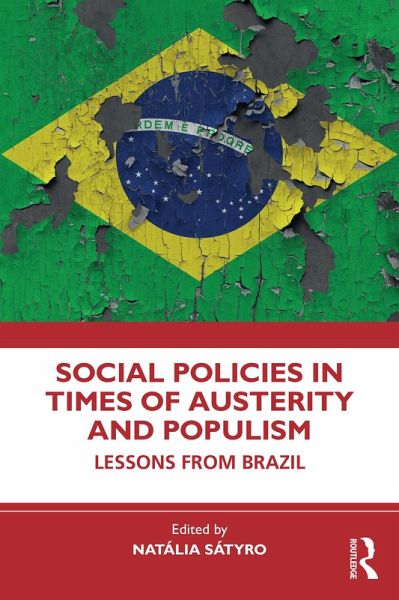
Social Policies in Times of Austerity and Populism (eBook, PDF)
Lessons from Brazil
Redaktion: Sátyro, Natália
Versandkostenfrei!
Sofort per Download lieferbar
38,95 €
inkl. MwSt.
Weitere Ausgaben:

PAYBACK Punkte
19 °P sammeln!
Featuring the latest research by Brazilian-based scholars previously inaccessible to an English-speaking audience, this book is a timely, authoritative, multidisciplinary overview of social policies in Brazil during the Temer austerity and the Bolsonaro populist presidencies. The breadth of policies studied herein provides clues on the political agenda, preferences, and strategies during this tumultuous period in Brazil's history.Divided into four parts, Part I is a conceptualization: it brings basic understanding of Brazilian social policies, explains the trajectory of the Brazil political la...
Featuring the latest research by Brazilian-based scholars previously inaccessible to an English-speaking audience, this book is a timely, authoritative, multidisciplinary overview of social policies in Brazil during the Temer austerity and the Bolsonaro populist presidencies. The breadth of policies studied herein provides clues on the political agenda, preferences, and strategies during this tumultuous period in Brazil's history.
Divided into four parts, Part I is a conceptualization: it brings basic understanding of Brazilian social policies, explains the trajectory of the Brazil political landscape, including the growth of a populist right-wing movement, the economic crisis and the increase in poverty and inequality in Brazil prior, and the threat to democracy brought about by the disinformation ecosystem. Part II discusses social security, social assistance, conditional cash transfers, and healthcare. Part III analyzes the neoliberal strategies to social investment policies, specifically labor, family, and education. In Part IV, the authors turn their attention to non-conventional topics that are not typically included in research on welfare state retrenchment, including the environment and indigenous rights, and police violence and gun control.
Social Policies in Times of Austerity and Populism is unhesitatingly recommended to all those who teach welfare state politics, comparative public policy, development studies, Brazilian politics, and right-wing politics.
Divided into four parts, Part I is a conceptualization: it brings basic understanding of Brazilian social policies, explains the trajectory of the Brazil political landscape, including the growth of a populist right-wing movement, the economic crisis and the increase in poverty and inequality in Brazil prior, and the threat to democracy brought about by the disinformation ecosystem. Part II discusses social security, social assistance, conditional cash transfers, and healthcare. Part III analyzes the neoliberal strategies to social investment policies, specifically labor, family, and education. In Part IV, the authors turn their attention to non-conventional topics that are not typically included in research on welfare state retrenchment, including the environment and indigenous rights, and police violence and gun control.
Social Policies in Times of Austerity and Populism is unhesitatingly recommended to all those who teach welfare state politics, comparative public policy, development studies, Brazilian politics, and right-wing politics.
Dieser Download kann aus rechtlichen Gründen nur mit Rechnungsadresse in A, B, BG, CY, CZ, D, DK, EW, E, FIN, F, GR, HR, H, IRL, I, LT, L, LR, M, NL, PL, P, R, S, SLO, SK ausgeliefert werden.













